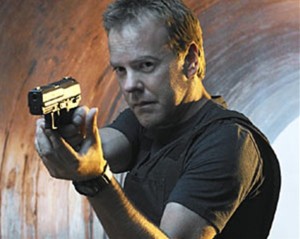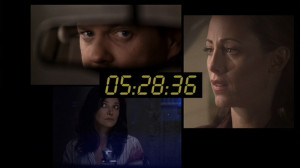As a teenager, 24 was one of the first television shows to really draw me in. I’ve been revisiting it, and it’s spurred a lot of thoughts about how television has evolved and why the show held such wide appeal during its run. It was an intense and tightly edited series. It told multiple stories in parallel, the drama was generally compelling, and the main character was an uncompromising badass. Kiefer Sutherland really knows how to look good running around with a drawn pistol. Now that I’m a bit older and wiser, the show seems almost crass in the simplicity of its dialogue, character construction, plotline, and the absurd quantity of cultural and gender stereotyping that fuels the conflicts and interactions across the show. But it’s an interesting case study in how network television channels managed to escape the mire of episodic sitcoms that dominated the 90’s.

In 24, characters frequently behave in ways that are clearly motivated by the writers’ need to create drama and increase tension, lest the show drift into that most dangerous territory of the mundane. The writers are frequently shameless in how they generate character interactions, making heavy use of techno-babble simply to provide an excuse for characters to walk from one desk to another. What these characters actually do at their jobs is hilariously difficult to define. With all their talk of protocols, encryptions, and sockets, you might imagine that they’re in IT, but at no other point do these characters profess any expertise in the realm of technology or computers.
The writers skirt around this problem by placing focus on each character’s socio-emotional struggles and most importantly, on the consequences of failure or success. It doesn’t matter how the file was corrupted, what matters is that there’s a mole working against the good guys. It doesn’t matter what encryption socket (this is a term they actually use) the super-nerd transmogrified, it only matters that if they can’t get past it the bomb is going to go off.
This exclusive focus on outcomes is the defining feature of the writing in this show, and it allowed the writers to improvise as much as necessary. The real-time premise of 24 makes it very easy to gloss over the basic details for any given character. When a new character is inserted, there’s rarely a need to provide any introduction. Their dialogue is exclusively purposed towards the current storyline, and any tertiary details are unnecessary until the writers want the audience to become attached to the character. Characters can sometimes go multiple episodes without the audience having any specific notion of a character’s values, traits, personality, or background.
If the audience is caught up in the flow of the show, none of that will be noticed. If you never mention whether or not Kim has a boyfriend until 5 episodes in, there’s no problem with having her suddenly call this hitherto unmentioned boyfriend for help once she’s out of options. By being non-specific about the nature of any character’s background, writers are able to create a solution to their storyline problems on the spot without overtly compromising the trust of the audience. Glaring plot holes alienate dedicated viewers because the real joys of complex dramas are that they create fodder for viewers to chew on.
Take LOST, for example. The comparison here is surprisingly apt; both shows have a broad cast of characters that contribute to simultaneous plotlines and parallel storytelling. Featuring perhaps the most disastrous wrap-up of any modern television series, many people that loved LOST while it aired will have a hard time reflecting positively on it now. Re-watching the show is nothing less than torturous when you know how futile most of the storyline really is. While it was airing, however, it was an absolute delight to ponder the possible answers to all of the questions that the show posed. Many hours could be spent debating the various merits and flaws of the characters. I could still write essays on how much I disliked Kate.

The writers for LOST trapped themselves into a corner that, after 6 seasons, they simply couldn’t write their way out of. Part of the show’s initial lure were the countless mysteries the show offered up in just the first season. The polar bear, the smoke monster, the hatch, the Others, the French radio loop. Although they were able to navigate some of these points in respectable form, they had simply dug themselves too deep by the end of the show. It ends with a great, big “They were dead all along”. Thirty minutes of floppy dicks would likely have been a less insulting way to end the show.
While I hesitate to praise any of the writing in 24, it’s intelligent in how they pace feeding information to the viewer. Normally, this would make for a terribly dull experience. But that’s where 24‘s editing and production comes into play. One of 24‘s hallmarks was the split-screen shots used during sequence intros/outros and scene transitions. While far from the first show to make use of this effect, it’s a critical component to its ability to tell multiple stories in a way that most viewers can follow along with. Constant reminders are invaluable for helping the audience keep pace. Which is funny, given that the stories themselves are not that deep.

Examined apart from the rest of the story, each character is relatively simple and their conflicts are straightforward. Appropriate camerawork and great editing saves the day here. An inordinate amount of time is spent focused on facial expressions. There’s no time for thorough dialogue, monologues, or deep conversations in a real-time show. Facial expressions will have to do, and the hand-held camera helps drive home the sloppy, relentless nature of the events in the show. The editors also rely heavily on silence and hesitation to insert doubt and suspicion into the audience’s mind. The show is rife with betrayal and backstabbing, and with nothing but a second or two of a glare following a heated exchange, or an awkward pause in the middle of a discussion, the audience is pulled to attention, forced to question the truth of what they’ve just heard or what they’re about to hear. These techniques are used frequently throughout the show, often just as red herrings, or just to lead into minor plot points.
Anticipation is a major factor, too. The dialogue frequently reinforces upcoming events at specific times, and the ticking clock makes certain viewers won’t forget that the bomb is going to explode in an hour, that if the suspect doesn’t yield to torture soon enough they won’t get there in time, that if the agents don’t find the file they won’t have the code to disarm the bomb. Individually, these are simplistic narratives, but told in tandem it creates a stressful and addictive experience for the viewer.
It’s unfortunate that some of its qualities are so regrettable; there’s an overwhelming stench of sexism throughout the show, with almost every female character being a damsel in distress or seductress in one form or another. The cultural stereotypes also demand mentioning, as there’s relentless bald-faced stereotyping of Arabic, Eastern European, and Asian cultures, especially as it comes to politics and terrorism. Lastly, the show is a true icon of its time, with the immense abuse of terrorism as a focal point, and I can only imagine how much it fueled the imaginations of fearful Americans across the country after 9/11. I have no doubt that many people’s views on the morality of torture were molded by watching Jack Bauer foil countless terrorist plots with his creative torture techniques.
While it hasn’t aged particularly well, it’s fun to look back at 24 and see the components of its production that made it so compelling to watch and how these mesh with its failures. The elements that make it weak are endemic across myriad movies and television shows, but it’s a hell of a lot better than much of what came before it. It demonstrates the viability of yet another crutch to smooth over poorly-conceived plots, characters, and dialogue, but its strengths are indicative of the progress that mainstream storytelling has made over the years, allowing for a great variety of characters with deeper stories. I’d say that’s not so bad.